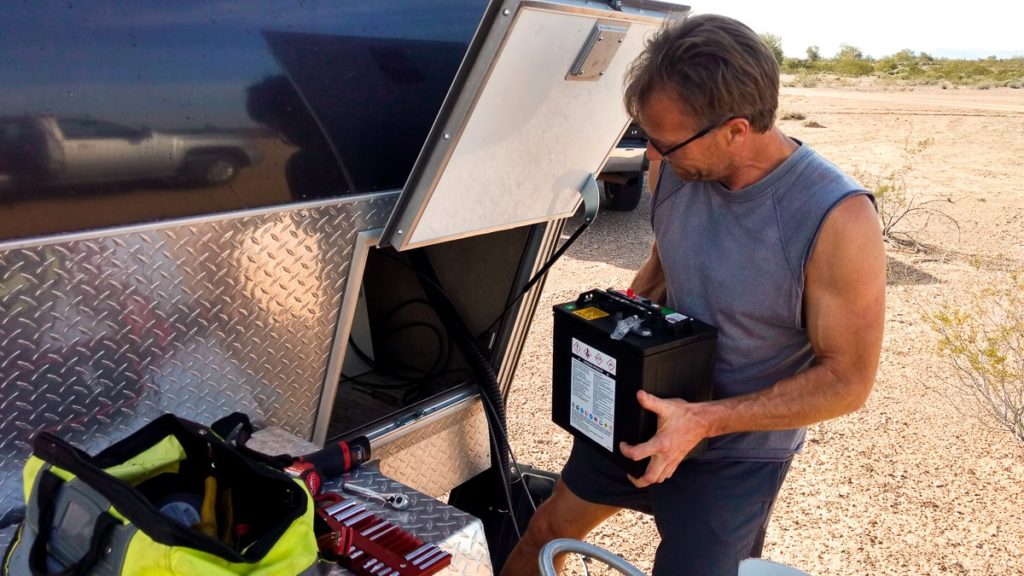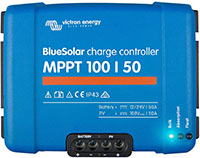You can use any kind of batteries with solar panels. Solar panels don’t care what batteries they are charging, and batteries don’t care what solar panels are being used. You can use lithium-phosphate batteries, lithium-ion batteries, lead-acid batteries, flooded cell or AGM. What matters the most is the solar charge controller.

What Kind of Batteries Do You Use for Solar Panels?
Most boondockers use lead-acid batteries with their solar panels. Specifically, they use flooded-cell batteries (the kind you pour water into) because these batteries are cheap enough to replace every 12 to 24 months.
All batteries have to be replaced at some point, and thus the cheaper the better. If you buy expensive batteries, then you will want to spend more time (and money) managing those batteries to maximize their life span. On the other hand, if you’re the type who’d rather “set it and forget it”, using cheap, flooded cell batteries are your best option.
- A 12 volt, deep cycle, 100 AH flooded cell battery will cost $120.00 on average.
- A 12 volt, deep cycle, 100 AH AGM battery will cost $250.00 on average.
- A 12 volt, 100 AH lithium phosphate battery will cost between $800.00 to $1,000.00.
The only real advantage of the AGM battery is that it does not produce any toxic fumes. Thus, it can be stored inside your living space. AGM batteries are popular with van dwellers for this reason. AGM batteries also charge more quickly, and they also get about 50% more life span.
Lithium phosphate batteries have their advantage in much lighter weight, about 30 pounds versus 60 pounds for flooded cell or AGM, and being able to sustain voltage all the way down to 0% state of charge. However, lithium batteries are very sensitive to cold; they cannot be recharged once temperature reaches 32 degrees F.
Tip: Many boondockers buy their batteries from Costco. Costco sells batteries made by Interstate. Costco sells these batteries cheaper than any other store, and gives you a 12 month warranty, with no questions asked. This means, you can return the batteries in the 11th month, and get a new set for free.
What Matters the Most is the Solar Charge Controller
It doesn’t really matter what solar panels you have nor what batteries you have. What matters is that you have a good solar charge controller to marry the two together.
The solar charge controller is a device that sits between your solar panels and your batteries. The controller makes sure your batteries don’t get “over charged”. Charging your batteries too much causes them to overheat and catch on fire.
A controller also decides how to charge your batteries properly by changing the flow of amps and voltage rate based on the battery manufacturer’s recommended specifications.
The industry is filled with cheap, Chinese-made solar charge controllers. This is where you don’t want to go cheap. Spend the extra money to get a high quality solar charge controller.
How to Find a Good Solar Charge Controller
- A good solar charge controller is programmable to accommodate any brand or type of battery. Make sure it will let you adjust the amperage and voltage for a battery’s “bulk”, “absorption”, and “float” modes.
- Solar charge controllers come in “MPPT” and “PWM” varieties. The “MPPT” is the more popular with boondockers because it allows solar panels to deliver their maximum power possible.
- Solar charge controllers made by “Victron Energy” are the most popular with full time boondockers due to their programmability and high quality standards. Their Blue Solar 100 | 50 MPPT (see it on Amazon) is the best selling controller, and probably the most respected controller among boondockers.
It Also Depends on How Much Battery Power You Want
If you want to run your air conditioning and refrigerator from solar and battery, and be able to do so for at least eight (8) hours a day, then you will want Lithium Phosphate batteries instead. The reason why is because air conditioners are huge electricity hogs, and being able to run one or two units for eight hours a day, will demand an awful lot of power. Refrigerators are electricity hogs only because they need to cycle on and off 24 hours a day, but are still not as bad as air conditioning units.
You could still do it with lead acid batteries but you will need as many as 20 to 24 of these batteries. Each 100AH, deep cycle, lead acid battery will weigh about 60 pounds. Thus 20 to 24 of those batteries will add almost between 1,200 to 1,500 pounds to your trailer or motorhome.
Meanwhile, a similar sized lithium phosphate battery is like having two flooded cell batteries because it can sustain voltage down to 0% state of charge, compared to 50% for a flooded cell. Thus, you’d only need 10 to 12 of these batteries to run both air conditioning and refrigerator for eight (8) hours a day. Lithium batteries are also lighter in weight, about 30 pounds total. Hence, you’re only adding 300 to 360 pounds to your trailer or motorhome.
You will also need at least 1,200 watts of solar on the roof to recharge those batteries. The more solar, the better.
What if I Don’t Need to Run My Air Conditioning and Refrigerator From Battery?
Then you probably don’t need lithium phosphate batteries. If you can use your generator to run the air conditioning, and propane for your refrigerator and heating, then getting four (4) flooded cell, 100 AH, lead acid batteries will do just fine. With that setup, you can add a 2,000 watt inverter and still be able to run your microwave oven, coffee maker, and (possibly) a toaster oven or small hair dryer.
You will want at least 600 watts of solar panels on the roof to keep those batteries recharged.



I have solar panels. What do I need for battery backup